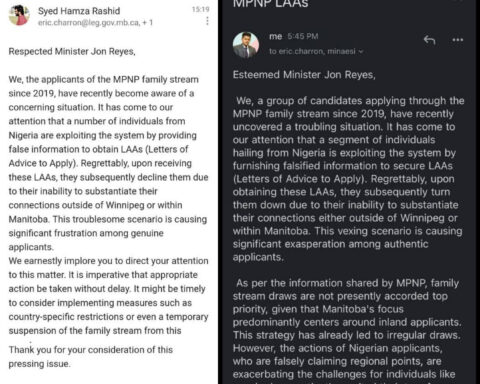In her August 27, 2015 Toronto Sun article titled “Immigration marriage scammers rightfully thrown out of Canada” columnist Michele Mandel expresses her overarching view that foreign spouses involved in marriage fraud are criminals and should be immediately deported.
Using the recent Federal Court’s decision in Li v. Canada (Minister of Citizenship and Immigration) 2015 FC 998 as her smoking gun, Mandel wades through select sections of the Federal Court decision attempting to show the court’s (and by extension, Canada’s) disgust towards immigrants like Li.
Generally speaking, I too, share Mandel, Citizenship and Immigration Canada (CIC) and Canada Border Services Agency’s (CBSA) concern about marriage fraud.
For individuals who legitimately fall in love with foreign nationals and wish to start a family in Canada, rampant cases of fraud truly serve to ‘ruin it for the rest of us.’
[I]f Canadians truly want to cut down on fraudulent marriages – there are several ways to do it that do not involve publicly ostracizing all foreign national spouses.
At the same time, however, I have some serious concerns over the public reporting and research that is done with respect to marriage fraud cases.
I believe that if Canadians truly want to cut down on fraudulent marriages – there are several ways to do it that do not involve publicly ostracizing all foreign national spouses, that instead get to the systemic roots of the problem.
Going overboard on foreign nationals
It is clear that Mandel is a very persuasive writer and, by virtue of the Sun’s previous reporting on this subject, presumably has a strong understanding of the events that led to the Federal Court decision.
On that note, I would argue that Mandel should have explained that the Federal Court did not rehear the case and only reviewed whether the decision of the Immigration Appeal Division (IAD) was reasonable and procedurally fair.
The Federal Court did not say “zaijian” or “refuse to block the deportation,” as stated in the article. The Federal Court does not have that authority.
In fact, Justice Gleeson’s decision, in line with her own judicial philosophy, focused on reviewing the IAD’s process of decision-making. In no way did the Federal Court lay any additional criticism at Li for her role in the fraud.
Mandel’s statements do not serve any argumentative purpose other than to speculate and rile up public distrust of immigrant spouses.
Second, I would argue that the most troubling part of Mandel’s article is her closing remarks, where she writes, “She’s headed home, but how many more are still out there?” She follows that up with an example of a “bogus groom” deported last year who told the IAD that “marriages like this” are so common in the Chinese community “no one is even surprised” by those who participate in them.
Mandel’s statements do not serve any argumentative purpose other than to speculate and rile up public distrust of immigrant spouses; however, they are not surprising.
In an internal CBSA report on marriage fraud, it was reported that the problem was “most prevalent in India” and it was estimated, without any evidence, that as much as 36 per cent of the spousal caseloads involving that country were potentially fraudulent.
Similar statistics have been used in other internal government reports that have attempted to paint birth tourism and live-in caregiver fraud as epidemic crises without adequate evidence backing up these allegations.
Finally, with all due respect, the supposed IAD quote about marriage fraud, which does not show up reported in any written IAD decision, is not useful given neither the case, nor context of its use was provided.
I would argue against the value of using select oral testimony from IAD hearings to purportedly represent the overall views of an entire Chinese Canadian community.
Canadians just as responsible
What Mandel fails to mention is the fate of those who put together the marriage fraud scheme – the Canadians involved. We know for a fact that a Canadian citizen who ultimately gained the financial benefit from the arranged marriage was Li’s bogus sponsor.
Furthermore, we know from the Toronto Sun‘s past articles that there were several individuals involved in “Project Honeymoon”. If my reading of the situation is correct, most, if not all, of them were Canadian citizens and as such avoided loss of status or deportation and served only short sentences.
Foreign national victims of immigration fraud currently have few safe, independent venues to report their situations anonymously and seek appropriate advice.
In my opinion, the immigration system itself is currently too light on marriage fraud arranged by Canadians. The light penalties under immigration legislation pale in comparison to the seriousness of fraud charges under the Criminal Code of Canada.
At the same time, many of the scheme’s masterminds are able to hide themselves behind the foreign national’s own signature endorsing the information contained in the application. Foreign national victims of immigration fraud currently have few safe, independent venues to report their situations anonymously and seek appropriate advice.
I have also heard from several individuals who truly did not know what was in their own immigration application due to language and communication barriers. Many sought counsel in the first place only because CIC’s own resources were unclear or unavailable.
They often contact ghost consultants or agents that are either posted abroad or operate in Canada with little to no regulation by Canadian immigration authorities or professional regulatory bodies.
Many of the resources they provide to clients are only in third languages. CIC and the regulators are ill equipped to monitor the quality or competency of these service providers.
Finally, to make matters worse, in countries like China it is illegal for Canadian consultants and lawyers to provide Canadian immigration advice without a Chinese immigration licence.
From what I have heard and seen, utilizing domestic Chinese agents is the only way of doing business in China, creating the kickbacks and referral fees that lend themselves to the birth of marriage fraud schemes. These schemes are often so sophisticated that they can be unbeknownst to the Canadian consultant or lawyer signing the application.
Before we ask ourselves ‘how many more fraudulent spouses we need to deport,’ let us first ask ‘how many fraudulent companies we need to report’ here at home and abroad.
We should also ask our foreign partners, especially foreign governments, how much more rapport we should be building abroad to develop new cooperative ways to regulate the illegal practice of immigration.
It is only in this way, not through aggressive media stories lambasting immigrants, that we can tackle the issue of marriage fraud.
Will Tao is a Canadian immigration lawyer and freelance journalist based out of Vancouver, B.C. He is the co-founder and lead-author of the Canadian immigration blog, Vancouverimmigrationblog.com.




